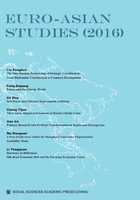
4. Russia's national image and soft power
With economic globalization gaining momentum, national image had become an important indicator of a country's position and influence in the world. Russia often ranks in the midstream or even worse among some lists of international images and brands. This phenomenon can in some ways be attributed to the fact that Western discourse and criteria dominate a number of international evaluation institutions. But it should be admitted that the indicators truly reflect Russia's soft power in the current stage.
Table 1 Russia's ranking in relevant global lists in 2013

Sources: The New Persuaders VI (IFG), Anholt-Gfk Roper Nation Brands Index 2013, The FutureBrand Country Brand Index 2012-2013, The World's Most Competitive Countries (IMD) 2013, The World's Most Reputable Countries (Reputation Institute) 2013.
From the above-stated statistics, a country's economic strength can certainly impact its ranking on relevant lists but the influence is not obvious. Russia is such an example. Its GDP ranks among the top 10 in the world but its soft power, national branding and international reputation lag behind. Therefore, compared with hard power like economic strength, varieties of soft power including government efficiency, social stability, public credit in government, media influence, number of world heritages, convenience of travel, and the influence of refined and popular art, wield more significant impact on a country's image and position in the international community. Russia should inject more energy in these fields to improve its soft power in the future.
Russia's academia and political circle have gradually enhanced their understanding of soft power. The process from civil diplomacy, public diplomacy and national image building to soft power development is a requirement of the era and the changing international environment as well as a demonstration of Moscow's increasingly mature concept of state governance. The Kremlin views soft power as a tool to gain its national interests and therefore its relevant strategy underlines a defensive posture, in an attempt to remove the Western world's misgivings and eliminate unfavorable public opinion in the international community. Nonetheless, Russia, a country habituated to using force to resolve international conflicts and hotspot issues, lags far behind the West in adopting soft power. As celebrated Russian scholar Sergei Karaganov noted in the aftermath of the dispute with Georgia, Russia has to use “hard power, including military force, because it lives in a much more dangerous world … and because it has little soft power — that is, social, cultural, political and economic attractiveness.”
Russia's soft power practice has also provided a lesson for us: it is shortsighted to value nothing but agenda setting and publicity techniques, and shape national image through major events. If Moscow fails to focus on domestic governance, improve national institutions and make scientific and reasonable foreign policy, it will confront difficulties in building a favorable national image. Even if it does, such an image will hardly last long and form an authentic soft power. Developing soft power is a consistent and systematic mission.